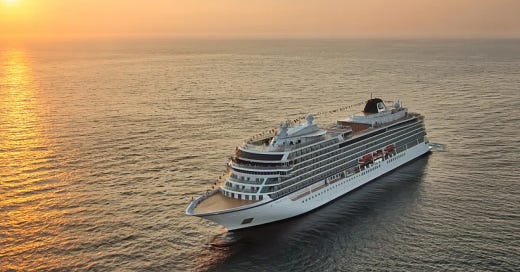🚢 The Cruise Industry and Younger Generations
Cruises are attracting more Millennials and Generation Z
The cruise industry seemed close to drowning during the early years of the pandemic, but is now reviving thanks to younger passengers. Cruises are attracting Millennials and Generation Z in large numbers. Royal Caribbean Cruise reports that half of its passengers are Millennials and Gen, the fastest-growing segment of their customer base. The shift has prompted a fall in the average age of cruise passengers for two consecutive years, a trend that had remained stagnant since at least 2016.
Nobody has benefited from the trend more than Royal Caribbean, which swiftly recovered from the pandemic and launched two of the largest cruise ships ever built.
Since hitting a low in March 2020, Royal Caribbean's stock price has surged nearly 600%, outperforming Carnival, up 88%, and Norwegian Cruise Line Holdings, gaining 142%.
Royal Caribbean's new ships, featuring upscale dining options, adults-only areas, and private Caribbean islands, have broadened its audience. Its 2024 earnings are projected to be 50% higher than their pre-pandemic levels in 2019.
The cruise industry as a whole is catching up with the broader travel sector.
In 2022, ocean cruises carried 31.7 million passengers, a 7% increase from 2019, despite a 12% decline in international tourism over the same period.
This year, cruises account for 7.2% of US travel expenses, up from 5.8% in 2019. It’s fairly slow but steady, with noteworthy growth that bodes well for big cruising companies. This doesn’t seem to be a fad or a trend, but is telling of how millennials who are aging want to consume experiences.
The pandemic exacerbated a trend that younger Americans set. They prioritize travel and experiences over things like homeownership. Cost is obviously a big factor for most travelers, especially younger ones, but cruises are typically cheaper than other vacation options. Advocates believe cruising is a cost-effective way to see the world.
In 2023, the price of booking a cruise was 40% below a comparable land-based vacation, and although this figure has now adjusted to around 20% which is a sizable difference.
The rising cost of travel has further boosted the appeal of cruises.
Since January 2023, vacation expenses have jumped by 13% compared to pre-pandemic levels. The cost of dining out and car rentals has increased by more than 20% since 2019. Airfares have remained stable, but tickets often exclude amenities like carry-on bags.
Social media influencers are also driving the shift in cruises. Deloitte’s 2024 travel outlook found that 42% of Gen Z and 26% of Millennials use short video content to plan their trips, compared to just 12% of Gen Xers.





